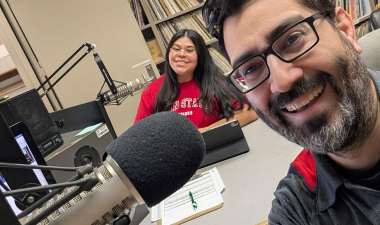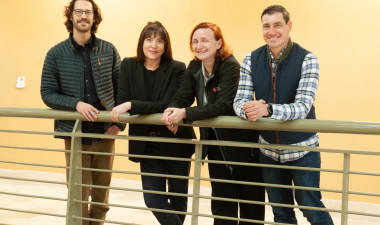Stan State’s latest addition to its computer science faculty has traveled a long way to reach the University, where she’s not only conducting research that could benefit disciplines across the campus but pursuing her true passion for teaching.
“I’m working on something called social network analysis,” said Ayat Hatem, who was a part-time lecturer at Stan State in 2014 and returned in the fall as a full-time faculty member. “It’s a way of representing data. You collect data in different areas — math, biology or any area — and you find ways to visualize the data. One of my main goals is to work in interdisciplinary research helping faculty members in other departments to analyze their data. I want them to learn more about the different techniques that exist in computer science and how to solve problems related to the data they have.”
She’s enlisting students to help with her research, introducing them to the reach of computer science in various academic fields as she was introduced as a master’s candidate in her native Egypt to bioinformatics. She continued to study that field at Ohio State University, where she earned her Ph.D. but the biggest lesson from that work was realizing she wanted to teach.
“I felt like it was very rewarding to work with students,” Hatem said. “Even if I do research, I want to work with undergrad students. I want to extend their horizons. I don’t want them to wait until the moment they take their Ph.D. to realize they can think for themselves. It’s not just about someone telling them what to do. They can do the work and really think without having a Ph.D.”
Often, students who complete studies in Hatem’s field are lured to lucrative positions in the tech industry. Universities struggle to find qualified computer science faculty, Stan State Computer Science Department Chair Thomas Carter said.
After completing her doctorate at Ohio State — she’d earned her bachelor’s degree at the University of Cairo and her master’s at Nile University — Hatem sought teaching positions.
Stan State hired her as a part-time lecturer, but she left after the 2014-15 school year.
“I really enjoyed working with this department,” she said. “Everyone was so friendly. Everyone was so helpful. It felt like family.”
She needed a full-time position and an employer to sponsor her visa and green card.
The University of Massachusetts-Lowell did that, and she and her husband and two children moved to the East Coast. She taught there for a year, then the family moved to Southern California for two years, while her husband, also a native of Egypt, did post-doctoral work after also obtaining his Ph.D. from Ohio State.
“I decided I wanted to homeschool my kids, get that experience and get to know them,” she said.
When the family returned to Northern California, where her husband works as a software engineer for Amazon in Sunnyvale, and after she had a third child, Hatem was ready to teach college students again.
Stan State had openings and she eagerly applied to a place that held such fond memories.
Hatem has been assigned to teach software engineer, data structures and algorithms, artificial intelligence and social network analysis. Some of those courses lend themselves to bringing interested students into her research.
“In one of my classes, it’s a brilliant group,” she said. “One of my students was working with someone from the biology department. He said, ‘Why don’t we write down this tool to help them analyze some of the data they’re working with?’ They were doing things with data manually, and it takes a huge amount of time. When the team I worked with started to implement some codes, that made things much faster for them. The tool would analyze the data for them instead of them doing it manually.
“I want to help others to be able to get that part of how-to, the techniques that are existing with the data you're collecting so you create faster results and better analysis.”



